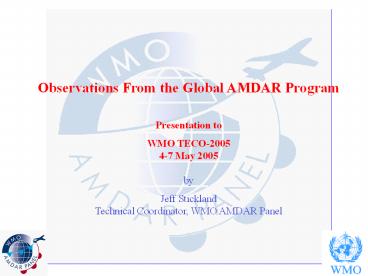Observations From the Global AMDAR Program - PowerPoint PPT Presentation
1 / 20
Title:
Observations From the Global AMDAR Program
Description:
onboard avionics and communications hardware and software; ... AMDAR software installed in the aircraft avionics or communications hardware; ... – PowerPoint PPT presentation
Number of Views:21
Avg rating:3.0/5.0
Title: Observations From the Global AMDAR Program
1
Observations From the Global AMDAR
Program Presentation to WMO TECO-2005 4-7 May
2005 by Jeff SticklandTechnical Coordinator,
WMO AMDAR Panel
2
System Description
- Collects high quality upper air observations of
wind speed and direction, temperature, and
sometimes turbulence and humidity
- From many existing commercial aircraft
- In collaboration with national domestic and
international airlines
- onboard avionics and communications hardware and
software
- Airlines normally use the international
communications system called Aircraft
Communications and Reporting System (ACARS).
Global services are provided by 2 companies
ARINC and SITA.
3
System Description (cont.)
- airline ground-based data processing systems
- No new hardware is required on the aircraft
- The only additional requirement to make AMDAR
work is special AMDAR software installed in the
aircraft avionics or communications hardware
- Humidity sensors are being developed and will be
added in the future to SOME aircraft
TYPICAL AMDAR INSTALLATION
4
(No Transcript)
5
Why is AMDAR Data Needed?
- To provide a cost effective source of upper
air observations to support national, regional
and global basic meteorological operations and
research
- AMDAR data can be used in most meteorological
applications that use upper air data obtained
from conventional observing systems. Vertical
profiles of temperature and wind are often the
most valuable
- Examples in operational bench forecasting for
the short to medium term include- - Severe weather forecast and warning services
- Public weather forecast and warning services
- Aviation weather services (enroute and terminal
area forecasts supporting airlines, air traffic
control and airport operations - Marine and industrial applications
- Environmental monitoring and warning
applications - Climate studies, etc.
6
- To meet the NWP communitys requirement for
greater quantities and improved coverage of
relevant upper air data
- For forecast verification
- To help provide a more comprehensive assessment
of the atmosphere for local modelling research,
local forecasting, etc
- To provide data from data sparse areas around
the world to improve local forecasts and
to contribute to the WMO World Weather Watch
Global Observing System
- Operational Cost compared to radiosonde is 1
7
Data Requirements
Desirable Horizontal Spatial and Temporal
Density 1 profile on 250 km grid at 3 hourly
intervals
8
Data Requirements (cont.)
Additional Data
9
Mandatory and Optional Reported Elements
Element Mandatory/Optional Requires
Additional Onboard Processing Aircraft
identifier M Phase of flight M Latitude
M Longitude M Day time of
observation M Pressure altitude M Static
air temperature M Wind direction M Wind
speed M Maximum wind M Roll pitch angle
flag M Humidity O Turbulence
O Icing O
10
(No Transcript)
11
24 Hour Global Coverage 13 April 2005
Courtesy NOAA FSL
12
24 Hour AMDAR Profiles 13 April 2005
Courtesy NOAA FSL
13
E-AMDAR Temperature Quality
Frequency distribution of the mean temperature
difference (OBSBackground) KNMI QEV Report -
April - June 2001
14
E-AMDAR Wind Speed Quality
Frequency distribution of the mean wind speed
difference (OBSBackground) KNMI QEV Report -
April - June 2001
15
WVSSII on N407 Versus Sonde at Mexico City,
1253, 28 March 2005
16
LIT WVSS-2 vs. Raob Comparison
17
SDF WVSS-2 Comparisons 31 MAR 05 Comparisons of 4
WVSS-2 aircraft on descent into SDF. Between 06z
and 08z the profiles changed markedly as a
line of thunderstorms approached and moved
through, along with cold front passage. 2
Ascents are also included. Things stabilized by
around 10z.
18
(No Transcript)
19
(No Transcript)
20
(No Transcript)






























